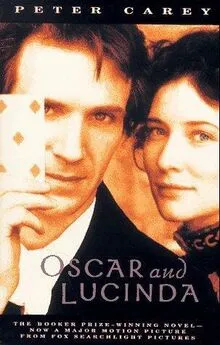Peter Carey - Oscar and Lucinda
- Название:Oscar and Lucinda
- Автор:
- Жанр:
- Издательство:Vintage Books
- Год:1988
- Город:New York
- ISBN:0-679-77750-4
- Рейтинг:
- Избранное:Добавить в избранное
-
Отзывы:
-
Ваша оценка:
Peter Carey - Oscar and Lucinda краткое содержание
The Booker Prize-winning novel-now a major motion picture from Fox Searchlight Pictures.
This sweeping, irrepressibly inventive novel, is a romance, but a romance of the sort that could only take place in nineteenth-century Australia. For only on that sprawling continent-a haven for misfits of both the animal and human kingdoms-could a nervous Anglican minister who gambles on the instructions of the Divine become allied with a teenaged heiress who buys a glassworks to help liberate her sex. And only the prodigious imagination of Peter Carey could implicate Oscar and Lucinda in a narrative of love and commerce, religion and colonialism, that culminates in a half-mad expedition to transport a glass church across the Outback.
Oscar and Lucinda - читать онлайн бесплатно полную версию (весь текст целиком)
Интервал:
Закладка:
She did not belong in this stateroom with its vast curved empty space, its maroon carpets, its shiny icing of luxury. She did not even belong in the clothes, smart clothes from Marian Evans's dressmaker in the Burlington Arcade, and she recognized, the first night in her stateroom, with Barchester Toivers resting in her lap, that it was only at Mr d'Abbs's house that she could be relaxed amongst ordinary people.
If these stewards had met her in the company of Mr d'Abbs, Mr Fig and Miss Malcolm (and it was by no means possible) they would play cards with her and not think about it. They would see that she could laugh, even drink and, if they were not careful, fleece them of their shore pay at three in the morning. It was a vulgar house, it was true, and in many ways, quite morally doubtful. It was a shock to realize that one "belonged" there-it was so second rate, colonial, even ignorant, but she could sit at the table there and not feel herself constrained by the corsets of convention. She did not have this dreadful tightness, in the throat, the arms, the chest. In the dining room these stewards were actors in a play-they used
188
Pachinko
different voices. She could not match the voice she heard at night with the voice that served her in the morning. When she sat at table she felt complicitous with them. She imagined that they, like her, felt restricted by their parts.
Meals, in any case, were an embarrassment. The dining room was all Grecian, with fluted columns, empty tables. There were four reluctant officers appointed to dine with her. She entered, blushing red. She ate as quickly as politeness would allow. She knew (or imagined) that her character, her passions, her occupation would all be unacceptable, even shocking, at this table. Her companions thought her a mouse. So she was. They made her one. She would rather have been playing Blind Jack or poker. There was, she thought, as she sliced her grey roast beef, so much to be said in favour of a game of cards. One was not compelled to pretend, could be silent without being thought dull, could frown without people being overly solicitous about one's happiness, could triumph over a man and not have to giggle and simper when one did it. One could kill time, obliterate loneliness, have a friendship with strangers one would never see again, and live on that sweet, oiled cycle of anticipation, the expectation that something delicious was about to happen. Which is not to say that the pleasures were all related to gain or greed. One could experience that lovely lightheaded feeling of loss, the knowledge that one had abandoned one more brick from the foundation of one's fortune, that one's purse was quite, quite empty, had nothing in it but a safety pin, some dust, its own water silk lining, and no matter what panic and remorse all this would produce on the morrow, one had in those moments of loss such an immense feeling of relief-there was no responsibility, no choice. One could imagine oneself to be nothing but a cork drifting down a river in a romantic tale by Mr Kingsley. In her first months as proprietor of the Prince Rupert's Glassworks she had played a hand of cribbage with the men during their breaks. She had seen this as a way whereby she could get to know them. But within a month they sent a message to her (back through Mr d'Abbs of all people) that they did not think it "proper" that this practice continue. She would never be able to think of this message-delivered by an embarrassed Mr d'Abbs in the foyer of Petty's Hotel-without feeling the sting of their rejection. It hurt out of all proportion. It would not go away. She thought: All the time I have enjoyed the games, they have thought me a tart or something worse. She wished to weep for her stupidity, or slap them for theirs. She had been proud of what the works produced. She was moved
Oscar and Luanda
by the process as she always would be by the collaborative nature of human endeavour. She saw she had purchased a hell-hole that must always be a hell-hole and yet she was much affected by the way the men made themselves into a chain with chaos at one end and civilization at the other-the cockeyed little first gatherer, the sturdy, barrelchested second gatherer, the handsome old third gatherer who would never be a master, the blower himself with his great grey beard and his arms as big as a boy's legs, the finicky stopper-offer who ran about, fast, bent over, like a mynah bird on a branch. She had felt it wrong to be the proprietor of such a hell-hole where the men must work in water-doused chaff bags, be awake at three a.m. (or ten p.m. or dawn) to meet the demands of the furnaces. But even though she could never become romantic about the hardness of their lives she also came to envy them their useful comradeship and it was through the doorway of a game of cards she hoped to enter it. She aspired only to play a useful part in manufacture, even though she was their "master."
Their rejection of her produced the most unchristian passions in her breast. "No gentleman," they told her, "would gamble with a lady." Her feelings were of the same order as those of a parent who wants to dash a howling baby to the floor.
She listened to the Leviathan's stewards and imagined being admitted to their game. She would knock on their door. She would introduce herself.
But she knew, of course, that they would immediately revert to their "steward" character. It would be an intrusion on their privacy too gross to contemplate. But surely, somewhere, there was a game got up. She imagined carpenters and engineers 'tween decks. She took her own deck of cards, the new ones purchased in Old Bond Street. They were Wetherby Suprêmes with the handsome black and gold filigree on their calendered backs which she always believed to be especially lucky. She snapped open the griffin seal which kept them in their place and shuffled them in her practical little hands, lengthening her top lip as she always did when excited-not a useful tic for a poker player to have-and cut them, splayed them, made a bridge and closed it. She had an ache. She felt it in the back of her knees, in her knuckles, a tension both pleasant and unbearable.
If she just walked, for instance, down to the regions known as 'tween decks, there would be an open door. There would be a game. She would stand and watch. They would not mind. She imagined it exactly. Four working men at a table. She would show them her own cards. 190
Pachinko
Silly. Too stupid for words.
She put her Wetherby Suprêmes in her velvet purse and walked out of her stateroom. She was going for a walk, that was all.
She was going-of course she was-to inspect her cargo in the hold. This was her right. She was a manufacturer. She might not look like one to you, sir, but that only demonstrates your colonial nature. Not all manufacturers have side-whiskers and smoke cigars.
The equipment was from Chance Brothers. It would make the first window glass in New South Wales. She did not expect a town named after her for this. But neither, sir, did she expect to be patronized.
She opened the door to C deck and descended the stairs. She did not think about what she was doing.
Lucinda was looking for a game.
She moved along steel intestines of empty corridors from which she viewed, not four men around a table, but empty cabins whose new mattresses were still wrapped in brown paper; in some there were wood shavings and sawdust, even on D deck-a carpenter's tool box with a set of chisels so sharp that the sticky-beaking passenger cut her finger and had nothing but sawdust with which to staunch the flow.
It was not like being inside a ship at all, but like the innards of a reveted bridge, a great mechanical beast, the organs of an empire whose chimneys rose high into the Atlantic sky. E deck contained animals, stall after stall of sheep, cattle, llamas. There was a sort of terror here. The air was not pleasant. It was rich and thick enough to make her-she who still thought herself a countrywoman, at home with dung, mud, beasts-rich and thick enough to make her gag. There were caged birds, too, and a young lad who said it was his job to feed them and wanted, most of all, to know what it was like atop. He was a strong, well-made boy, but his face was pale, and his face thrust at her from the fetid gloom-one yellow electric light every ten yards-and she did not feel easy with his belligerent curiosity. He was not what she was looking for. He asked if she was a nurse. She was not a nurse. Then he wanted to know if it was true, what he had been told, that there are ladies and gentlemen atop who played racquets and hoops and would she please, when they were in Sydney, employ him, for he was good around animals and practical, and would not, not for his life, ma'am, go back to cruel England again. She barely heard him.
She asked him where the hold was. He did not know, but pretended he did. She knew he was lying with his directions, and yet she had the compassion to see him as innocent and herself
Oscar and Lucinda
not so-a beast in heat looking for a beastly game.
She found her way, by mistake, to the engine-room. She did not actually enter, but opened a great riveted door where the fragrance of oil was strongest and, looking down into the giddy steel pit, saw the two giant connecting rods churning round and round, a nightmare from Gargantua, and men, so far below they seemed like smudged ivory dolls, stripped to the waist, with tiny shovels. No one here was playing cards. They stopped and looked up at the intruder. She stepped back and closed the door.
If she had felt this bad in Sydney, she would have cooled her passion by visiting the Chinese. There were no Chinese here.
She did not like the feeling of this ship. It had tossed like a cork in the Bay of Biscay and all those long steel corridors seemed to be painted with the smear of sweat. There was no life in the ship. There had been races for ladies scheduled by a games committee but now it seemed they would not be held, for there were so few ladies on board and most of them not of a racing age. She climbed steel stairs, heading upwards. She passed an officer who blushed to see a woman where he had not expected one. She did not ask him where the hold was. She continued up. She passed a door on the other side of which something improper seemed to be occurring. She came finally to a small kitchen of the tea-and-toast type. There were two doors. She chose the right-hand one. Ahead of her was a red-headed clergyman sitting on a plush red settee. It was the secondclass promenade. She felt herself "nabbed," "caught in the act." She thought it undignified to turn back. She held up her head and straightened her shoulders. She came forward. She walked directly towards him. She introduced herself to him, and when he said his name, she did not hold it.
"I am in the habit," she said, "of making a confession."
"Quite," he said.
"Perhaps this is not a practice you approve of.",
"No, no," he said, "of course not." '
"I wonder, then," she blurted, "if you might oblige me at a time convenient to you." And then, not quite knowing what she had done, and certainly not why, she fled to those regions of the ship where Oscar dare not follow.
The sea looked like a dreary waste of waters. To the east she could see the smudged ambivalence which was Cape Finisterre. The great smokestacks above her head poured forth the contents of the stomach of the ship, black effluent into the chamber of the sky.
Читать дальшеИнтервал:
Закладка:









